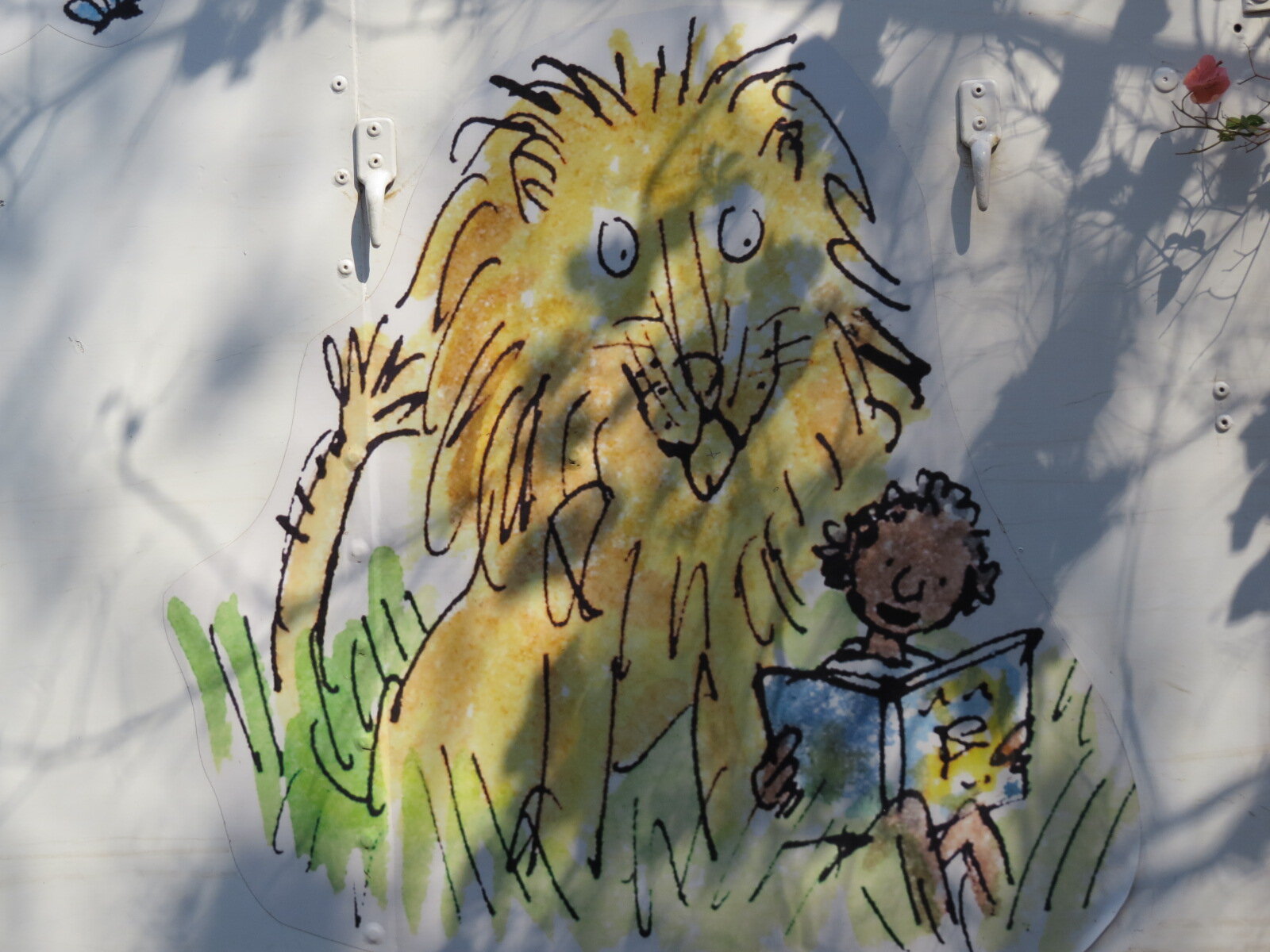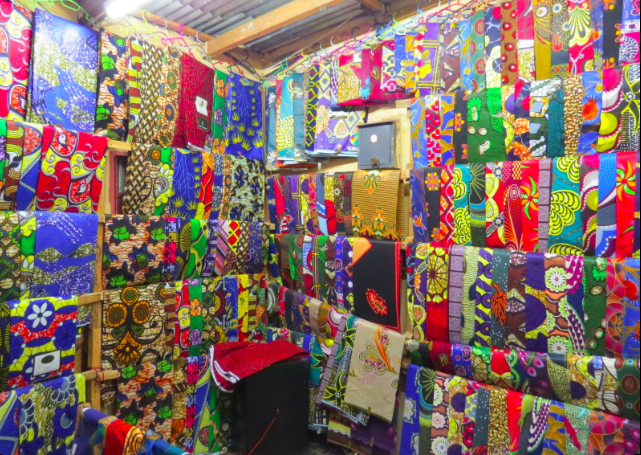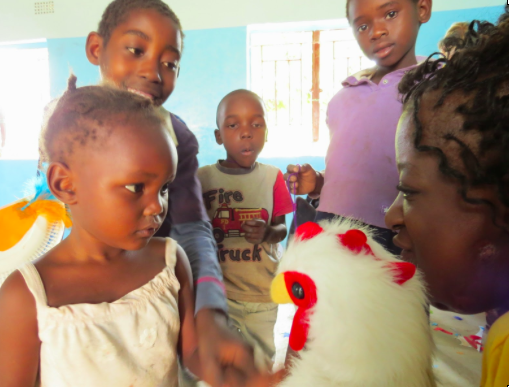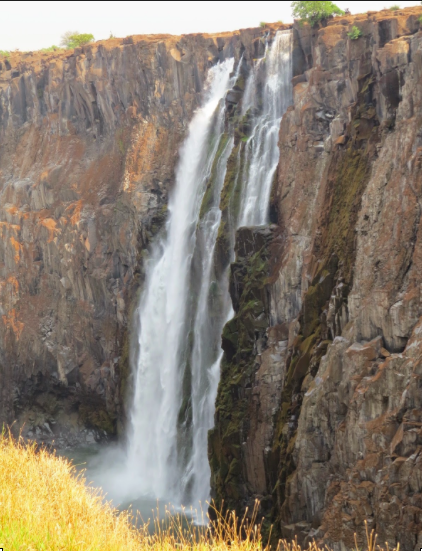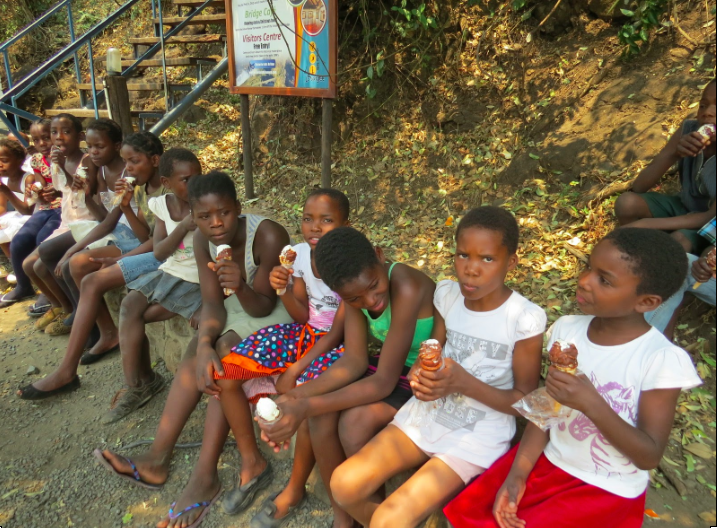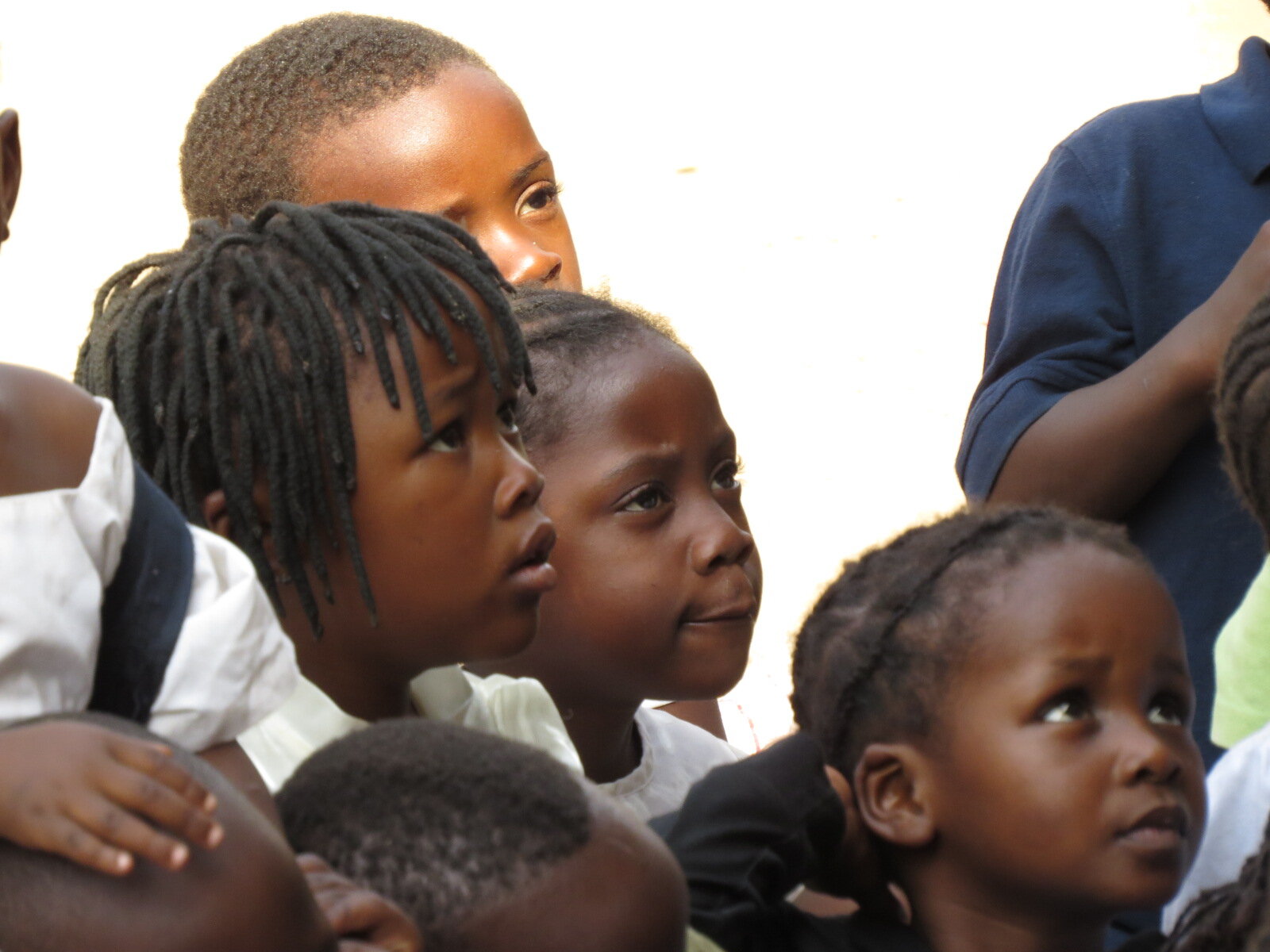It’s a long flight from Dubai to Lusaka, Zambia. We booked this African adventure, which includes books and wildlife, via Mambulu Safaris in Amsterdam. Rob, the owner of this tiny travel agency, loves Africa and specializes in custom made trips. We knew that he would taylor make this trip to fit both our interests and our budget.
Art on the Book Bus is by Quentin Blake
So when a nice young man from the travel company welcomes us at the airport, then takes our passports, money and disappears, we are not too worried.
He soon reappears with visas, smiles broadly and ushers us ahead of the line-up. We immediately re-check our backpacks, change some US dollars to Zambian kwachas and wait for our next flight to southern Zambia. Walking over the hot tarmac, seeing red dust and corrugated tin roofs - we know we have arrived in Africa. Finally.
Jacaranda trees in Zambia are breathtaking.
When Kees and I first dated, many years ago, he had a map of Africa on the wall and we dreamed of the places we would visit and explore. It took so long to make this dream reality. Once we were even offered a job in Africa but we had just recently immigrated to Canada and didn’t want to leave. But now we are here.
Our next flight takes us from the capital of Lusaka to Livingstone in the south western corner of Zambia. We are basically on the border with Zimbabwe.
We came here to work as volunteers with The Book Bus, a UK based charity. Quintin Blake, the well known illustrator of, among others, the Roald Dahl books, is on the Board. The Book Bus works in several countries. Its mandate is to bring books to children and educators who don’t have any. We paid to volunteer here. The cost includes our room and board but also allows the book bus to operate, to visits schools. The volunteers are often teachers or librarians who have experience with kids and books.
We stay in a walled compound of a large house with a swimming pool - great for cooling down after a hot day. We sleep on cots in a tent. Meals are at a picnic table under a stone roof.
Livingstone, named after the famous missionary of course, isn’t a very big town. We drove the main road lined with all sorts of shops - shoe stores, banks, phone shops, supermarkets. But just a few blocks away, people live in small houses and don’t own cars. They have no money to shop here. There are markets in other parts of town. If you can’t buy a large bag of sugar, you buy a tiny bag. So the stall owners measure sugar and flour and spices in bags of all sizes.
The fabric shop.
There is 70% unemployment here so many people just walk around on the streets. The women wear long colorful skirts, often with a matching headband. On top of their heads they carry their wares: huge bins of carrots or a crate of 24 bottles of soft drinks, a 2 meter long metal tube, even a mattress. It’s amazing to see the things that are carried on the head.
Babies are tied to the mother’s back in a colourful cotton shawl. They just lay the baby on their back, bend over, wrap the cloth around the baby and tie it at the shoulder. I’d be scared to drop the child but when they stand up - the child is securely strapped to their back.
We stop at a traffic light and Kelly, the British Book Bus lady, tell us “This is a brand new traffic light, the first in Livingstone. When it was first installed, they held a ceremony by building a grandstand at the intersection and dedicating the traffic light. Then,” she continues, smiling, “people from outside of town would come in and just sit at the intersection to watch the light change colours, because they had never seen a traffic light.”
We walk across the local market, the only white people here. You can buy used shoes or plastic buckets, dried fish, corn, tires, everything. We buy glorious African cotton and a long dress for me.
Volunteering with The Book Bus is an incredible experience. Kelly is multi talented, accepted and well loved by many Zambians. After six years here, she even speaks the local language. She capably runs the book bus. It is a huge old, repurposed, Safari vehicle with seats and open sides. The back and side walls have book shelves along the lengths. Together with volunteers who come from around the world, she visits local schools and community centers to introduce reading and books to the children. As soon as they spot the bus, children come running with huge grins on their faces. Without any shyness, they come up to us and cuddle up for a story.
Happiness is learning to read.
The older children are learning to read, all at different stages of their lives depending on how long they have been at school. As I read aloud, they chant along to learn the words. Even the older students are very keen on any activity. A 14 year old sits quietly coloring. Her name is Abigail Nakawala and she is in Grade 5. She just started school last year and used to stay at home to help her parents. When she started school she couldn’t write her name.
Abigail was asked what she thinks of the library. She says “It is a great place because even if you can’t read, it is so attractive and makes you want to read.” Her favourite book: is Tarzan, because “Tarzan has a good heart and he helps people”. She says that the story helps her learn how to help people. When she finishes reading Tarzan she will get to know another book so she can learn a lot. Abigail wants to be a teacher because she wants to help others learn what she is learning at school. She doesn’t want anyone to miss what she has missed before.
The Book Bus visits schools in town and in the bush. These schools are mostly concrete buildings, sometimes with desks but never with books. The Book Bus provides fiction, nonfiction, picture books, magazines, and much excitement. The volunteers do activities with the children, crafts, and read picture books. Then they help the students to select books to borrow.
When we arrive with the Book Bus in a neighbourhood of Livingstone, children come running from everywhere - alleys and homes - they run and follow the Book Bus to the community centre, which is a small 3 room hut made of plastered walls and a corrugated tin roof. Red dust flies everywhere.
Besides operating the bus, the organization is able to build small libraries at some of the schools. Kelly recently had a new classroom added - beautiful painted in bright blue - to serve as reading room. She even found someone to pay for new desks. The children were so excited to get desks to sit in, they stayed and waited all day, refusing to go home until the desks arrived.
I read my book Emma’s Eggs to them, and introduce them to my chicken puppet. Their eyes nearly pop out when they see Emma moving. When an African child smiles, it is like the sun breaks through - brilliant and bright. We read a butterfly story, do some counting songs and make paper butterflies. You can tell that a visit from the book bus, is the highlight of the day for these children.
On the way back to the compound, Kelly said, “You will want to see Victoria Falls while you are here. And, you know what? I have some funds left over in our budget. Let’s take some of the kids!”
In the Book Bus to Victoria Falls.
So a few days later we pick up 25 children at the community centre, in the Book Bus and take them on a field trip of their lifetime. These children live 10 KM from Victoria Falls but they have never seen it.
Hello Bookie Bussie!
At the center of Livingstone there are cars, paved roads and concrete buildings. But the further you go away from the center, the fewer cars you see, houses make way for huts. Some of these hang together of poles and pieces of plastic. Garbage bags often make roofs. Feed bags make walls. Everything is coated in red dust, yet even this gets neatly swept in the morning. The houses don’t have any running water.
As we left their neighborhood in the Book Bus, kids ran alongside chanting ‘Bookie Bussie’! Not everyone was able to come but those not selected did not seem resentful, rather they were excited for the lucky ones that did get to come. We had been driving for less than 10 minutes when suddenly, the kids erupted in loud cheers. I had no idea why, so I asked Kelly why they were cheering. She smiled and said, “We just reached the pavement. They’ve never been this far from home.”
The beautiful, happy children had showed up that morning in their Sunday best clothes and in shoes. None of the other kids wore shoes so this was truly a special occasion. Most kids have used clothes, and I don’t think I saw one pair of whole shoes. A teacher wore two different kind of flip-flops; one kid had a broken flipflop which had been fixed with wire underneath but kept breaking. Some kids walked all day on shoes that didn't fit and came off with every step… But they were clean, and proud. They sang loudly and grinned as they received a bottle of water and a package of biscuits each.
When we reached Victoria Falls (our non-resident entrance ticket cost more than all of the local children combined) we walked down the path to see different parts of the Falls. During the rainy season the Falls are over 1.5 KM wide and thundering in sprays of mist. Their Zambian name is much nicer than 'Victoria' falls: Mosi-oa-Tunya meaning ‘thundering clouds’. We were not here during rainy season but even now there were impressive parts, with rainbows in the spray and green puddles at the deep, deep bottom.
The children clung to our hands, sometimes I had three kids hanging on to my arms because they were so scared of heights. And they were so excited. Yet, if Kelly said “wait here,” they waited. No one ever misbehaved or strayed too far. They marveled at the Falls and loved walking across the bridge into Zimbabwe. We yelled “Goodbye Zambia, hello Zimbabwe!” as we crossed the dividing line and back. Then we ate ice cream, a rare treat for these kids.
I cried at the joy of these children to have water.
But the highlight of the day was when we found a large, clear pool of river water, left behind from when the river was higher. With a sandy bottom in hollowed out stone, it made a perfect splashing pool. At first they cautiously tiptoed in the cool water, splashing their hands and faces. But when Kelly said it was OK, they stripped off their shirts and dove in - many with clothes and all. These children have no running water at home and to see them enjoy this pool was pure joy. With huge wide grins on their faces, they jumped and thrashed and rolled in the water. We wrung out shirts and they flapped dry in the wind as we walked on. To see these kids frolic in the water is something I won’t easily forget: it was happiness personified and brought tears to my eyes.
Ice cream.. a rare treat.
When we arrived at the Falls parking lot, the kids had spotted a zebra. There were also tons of baboons, many with babies. And, knowing they might steal things from the bus, we had lashed it securely closed before we left. But even so, with one of us still on the bus, one baboon snuck in quietly behind us and took off with a bag full of biscuits… that monkey! The kids thought it was hilarious. But when we came back to the parking lot, the taxi drivers all laughed and pointed. They called “Kelly! There are baboons on the book bus!” Seven baboons had broken in and stolen bottles of Fanta…
Bad baboon!
On the ride home the children sang loudly, making people along the road laugh and wave. They sang a song something like this: “I am so happy today, because…” and then they took turns filling in the blanks: “.. because I had ice cream, because I saw Victoria Falls, because I swam in water, and… because the baboons stole the biscuits!”
They laughed so hard they were crying. Seeing Victoria Falls with these children made it into an unforgettable experience for us.
Back in their neighborhood, the kids climb off the bus clutching close their water bottle and biscuits we gave them. That’s when we realized that the kids didn’t eat their snacks. They chose to bring them home so they could share their treats with their family.
On our day off, we get up early to explore the area, with two local young men, by bicycle. What a great way to see the city and surrounding area. These young men are part of a job training school, with the income going to the school and the students learning different trades, like being a guide. We cycle through town, then across the railroad tracks to another area. A train from Lusaka chugs along, people leaning out of the windows. Trash is blowing everywhere.
Our two guides take us to see the local rock quarry where people work all day long, in the blazing heat, to pound rocks into gravel. Small children sit in the dirt, helping their mothers. It’s enough to never again want gravel in my driveway. A mother has a two year old strapped to her back while pounding, and more children around her, all working away. For a wheelbarrow full of gravel they might earn one dollar, if anyone needs gravel that day. Young boys haul the large rocks out of the pit and throw them up on top. Heavy, terrible work. But it is work and makes an income of sorts, with which they can buy corn and other food. We saw one boor hole in the area where people came with jugs of all sizes to collect water.
Local market
Everyone is lovely as can be, smiling and saying “Hello, how are you?” One smiling grandmother came over to us with her screaming 2 year old and held out her hand to us, saying to the child "See, there are just like us, just people!" The kid was scared of seeing white people...
We cycle along dirt roads lined with tiny houses and rackety shops. Cross over a railroad bridge and go to a market. Many stalls offer fish, fresh or dried, spices, fruits and all sorts of other wares. Others offer used clothing and shoes. Often it is donated clothing from North America that is sold here, instead of handed out to those in need. It’s amazing to see how clean people are, often wearing crisp white clothing. I feel dusty and grubby much of the time.
Children come running, calling “Hello!” "Mzungu!" we keep hearing, going from child to child, "white people are coming!" Kids would run up, wide grins on their faces, waving as hard as they can. I chatted with mothers and grandmothers, everyone with beautiful smiles. We get ‘home’ just when the temperatures get too high for cycling. A cold coke never tasted so good.
The Book Bus takes us to a different school each day where we read stories to and with the children, followed by activities. The school has no paper or glue or scissors. Even adults ask shyly if they can make an elephant mask or color a picture… In some places, the book bus attracts 300 children! At a village school along the main road a large group of children, grades 2 and 3, are overjoyed to see us. We read books, we color paper chickens and make butterflies. “Teacha, teacha!” they call, wanting crayons or to show off their work.
When we come ‘home’ with the book bus, we turn one large sheet of hardboard into a chalkboard by painting it with blackboard paint. And large squares of soft board are turned into brightly painted bulletin boards. Kelly is helping young women here to become assertive teachers and children to want to learn how to read.
Is the Book Bus for you?
Voluntourism is huge around the world. It is so much more meaningful to spend your holidays helping others, than to just fly somewhere and lie on the beach, right? But volunteering abroad can be expensive, even when you realize that part of your costs will help others.
Kelly and the volunteer team here read books to the children and conduct activities based on the books. I read two African animal tales to them and then they drew an animal and decorated it. We also made book journals to keep track of the books that have been read. Kees spent one entire evening tracing butterflies so that kids can color and cut. There is no photocopier here so it’s all done by hand.
Even though I have spent most of my life in children’s literature, and 12 years of weekly story time in a library, it’s the little things here that blow me away. The kids have no frame of reference for books about so many concepts. Of course, books are meant to be a window on the world and will teach them new things. But how can you relate to a pet fish when you live in Africa? Why would people paint eggs? Or keep a dog inside a house? These kids have no electricity or running water. Many people live in their small hut and struggle for a daily living. Books about food? Can’t use them… the kids are hungry. Even Dr. Seuss’ “You have feet in your shoes…” doesn’t fly here for many children.
The Book Bus accommodations are primitive. We sleep in a regular tent - no wooden floor, no veranda. Just a plain tent with, some broken, zippers in the red dust. There’s a kind of gazebo with a large picnic table where we spend most of the evening. It has a light. We cook outside on another picnic table. Dishes are stored in plastic bins. There is a fridge and a kettle and a power bar to charge our batteries.
After only 3 days in Zambia, I realize that I now find this place quite luxurious. There’s a pool with cold, refreshing water. A dusty bathroom block has toilets and showers with, sometimes, warm water. After working hard all day, Kelly cooks a pot of food for all of us and we do the dishes. The Book Bus’ compound is shady, sheltered and safe. It is a 20 minute walk into town to the supermarket, which has most things you could wish for. We hand wash our clothes in a large old bathtub outside, and laundry hung on the wires is dry within two hours.
If you want luxury, don’t come. But do come if you don’t mind camping in the heat, without air conditioning, and a very rewarding, unique experience. If you want to share your love of books with kids, see parts of Africa you would never normally see - there’s no better place. We only work mornings, leaving around 8:30 and returning by 1 or 2 PM. (called 13 or 14 hours in Zambia). If you love storytelling, reading picture books, and working with kids - do consider coming here. You can work as a volunteer for two week stretches. We saw more things than any tourist will ever see, being able to visit isolated villages where people opened their homes to us. Places you will not visit while on a regular ‘safari’.
Mambulu Safaris is the Book Bus’ official rep for the Book Bus in Holland. They included our Book Bus time into our entire Zambia trip for us.
Learn more about The Book Bus here: www.thebookbus.org
Check out https://www.mambulu.com for travel to and within Africa.
Click here for: BOOKS, then scroll down to Zambia.


